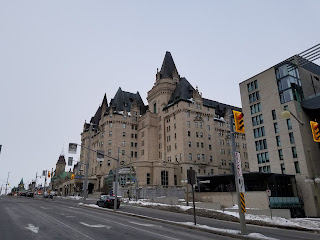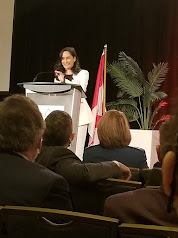 |
| So great to be in quiet downtown at Hogwarts. |
To start, I missed the virtual first day and the in-person second day due to competing commitments. I missed the big speech by the Chief of the Defence Staff yesterday alas. This morning kicked off with Dr. Cynthia Watson of the US National War College having a conversation with Richard Fadden, the former National Security/Intell Adviser (the closest thing Canada has to a National Security Adviser), focusing on China. It was very interesting. The focus at the start was on what does the Ukraine situation mean for Taiwan, with the possibility that it might change the timeline but not alter the CCP's stance--that Taiwan can't become independent and that it might just be invaded someday. One thing I hadn't thought of--the war in Ukraine has important implications for China's food security since it gets much grain from Ukraine and Russia.
Because she had to go after about 25 minutes, Fadden shared his thoughts, and he was quite sharp and coherent despite his assertions to the contrary. The big question: now that there is pressure to increase the defence budget, who much and to what end? He argued that while the developing countries support the sanctions against Russia, they will blame the west for the higher food prices that will harm them. He then asked whether the government is thinking beyond the short term--what is our strategy down the road?
 |
| This was not a manel as the French MoD speaker was zoomed in |
The next panel was on the Indo-Pacific with a mix of Canadian naval officers, retired American admiral (who spent way too much time talking about his background), French defense civilian, and Aussie attaché. I found it interesting, but I took poor notes.
 |
| I cleaned up for this event |
The next panel was the one where I chatted with Darren Bricker, who has written much on Canadian politics and works for the polling firm IPSOS. He once wrote a book about the Laurentian elite, so he took my question about the Ottawa bubble and ran with it. He discussed how it is not really inflation that is upsetting Canadians but the high price of housing--that the young folks are upset that they may not be able to buy a house. We discussed public opinion and the Canadian Armed Forces--that the scandals have had an impact on how the public views the CAF.
Most people were waiting for Minister of National Defence Anita Anand's talk, and the number of folks with multiple leafs on their shoulders increased by quite a bit. I don't think they were disappointed. She didn't say anything very controversial, but she was far more dynamic, interesting, and engaging than her predecessor. She made prof jokes while also doing a nice prof job of outlining her talk--focusing on Ukraine first, the wider international picture, and then the CAF. Her talking points were similar to other NATO leaders--that we would defend "every inch of NATO territory" which does not make Ukraine or Moldova or Georgia feel great, but, well, these various lines do matter quite a bit. She emphasized that the weapons and other equipment we promised to Ukraine have been delivered, which is remarkable for a government that decides slowly and procures even more slowly (except for vaccines).
She emphasized the focus on NORAD/northern warning modernization--that it is in her mandate letter--with $250m allocated and that is just the start. This was very much in line with the new consensus in town--that defence budget cuts are not going to happen anytime
soon thanks to Putin/Russia. In the Q&A, she was asked about whether we would go farther on NORAD stuff--to join the US anti-ballistic missile efforts. This is where she got the most careful in her wording--that we would be working very closely with the Americans. The ABM stuff is controversial because Canada didn't opt in way back when Bush was president since he was tossing out a key international agreement, and the Liberals are huge fans of the rules-based order. I think at this point, the ABM treaty is dead, so resisting is moot (that the US still can't reliably shoot down ballistic missiles is an issue, of course), but this seems to be a Liberal bugaboo.
Regarding the efforts to reassure the Baltics and deter the Russians, Canada is now indefinitely extending (which makes much sense and here's the episode of #BattleRhythm with a former commander of the battlegroup), surging a bit, and committing to another rotation of air policing in Romania (see this episode of #BattleRhythm for my interview with the officer who commanded the previous rotation). She noted that having more than 3k troops on alert is straining the force.
In the last part of her planned comments, she talked about the CAF. Much of her discussion was rah-rah--that the troops are doing amazing things in a very difficult time. And this makes sense--she needs their buy-in for the reforms she will be pushing AND the troops have been doing great things. However, resistance is already building to the culture change and other stuff that needs to be done as the past year has been a bit of a reckoning for the CAF--that the abuse of power scandal has revealed much about the CAF, and we need more clarity of what is being changed to inflict civilian control upon the military. She discussed procurement, committing to the 15 ships (of course) and to making a decision about the fighter replacement (seemed like she committed to this happening this year, but I may have heard wrong).
In the Q&A, Anand pushed back against having a new defence review, arguing that she is moving now to change stuff, and does not want to wait for a review. I would argue that Canada needs to have regular reviews, like other countries, so that we have a regular set of benchmarks that get evaluated and revised, that we adapt in a more regular fashion. She brought up the domestic operations (floods, fires, pandemic) in the Q&A, but I would have liked to have seen her discuss that as part of her comments. We need to move from domestic ops as an afterthought or as a fourth priority towards making that aspect of the CAF's work as important as expeditionary operations/alliance support.
Anand noted that she does not know how long she will be in this position as they have a minority government, so her focus is on doing what she can every day. Anand did a far better job yesterday answering a question I asked Vance when he was CDS in 2018: how do you make sure this stuff lasts beyond you? She talked about institutionalizing the reforms, so that these things will continue after her party loses an election (or if she gets elevated to another post). I didn't ask her any questions as I will have an opportunity to do that in the near future.
 |
| Dan does NPSIA proud. |



No comments:
Post a Comment